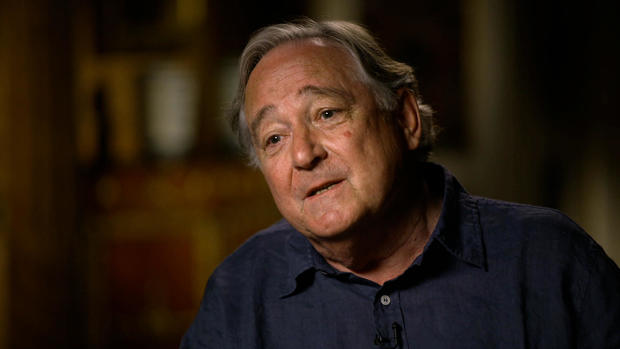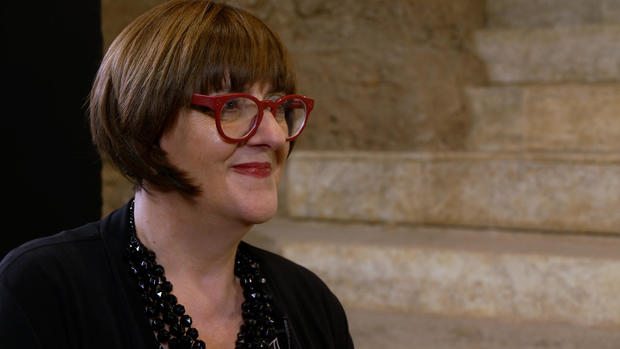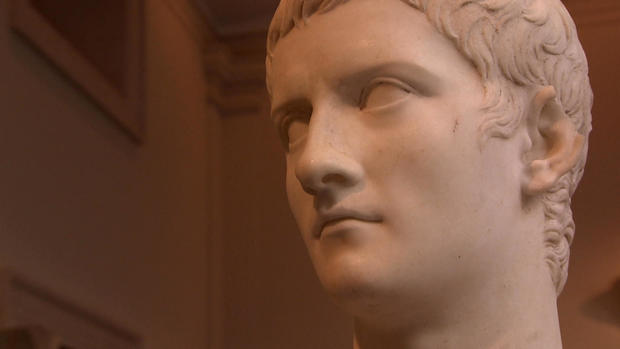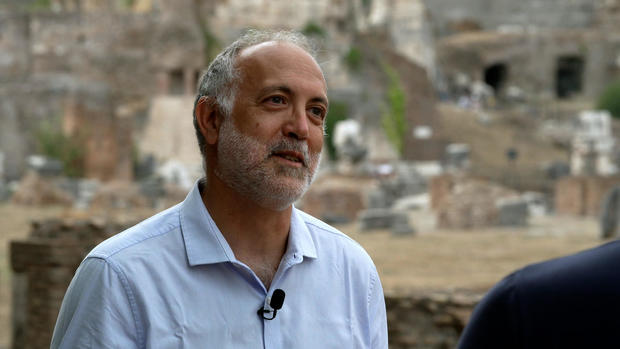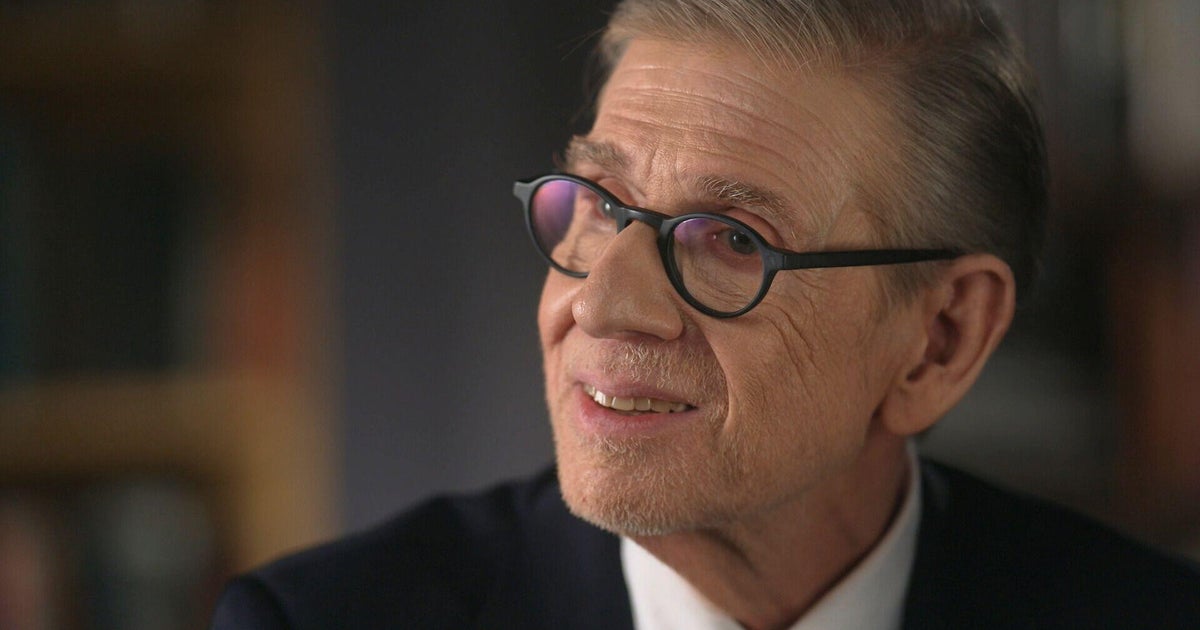Searching for the truth in Emperor Caligula's gardens in Rome
When workers broke ground on an underground parking lot in the heart of Rome 15 years ago, they had no idea what their backhoes were about to unearth. The site turned out to be what Italian archeologists believe was once "the pleasure gardens" of the Roman emperor, Caligula - where some 2,000 years ago all sorts of lavish parties, royal intrigue, and debauched behavior likely took place. Caligula became the third emperor of Rome in A.D. 37 and he reigned for barely four years. He's been portrayed in history as one of the most deranged and despicable Roman emperors ever to rule. But for years scholars have been re-examining parts of Caligula's story to see if history has it right. Could we discover some new fragments of truth in Caligula's Gardens? We were more than happy to go to Rome, to find out.
The temples and palaces of ancient Rome may have crumbled long ago, but the legend of one of its oddest emperors lives on.
What most people know about Caligula comes from this iconic BBC series "I, Claudius," which was based on two historical novels by Robert Graves. In the show, Caligula turns his palace into a brothel, makes his horse a high-ranking senator and declares himself a living god.
It's a torrid tale of incest, infanticide and imperial madness.
But how much of that portrayal is real?
Anderson Cooper: Did Caligula impregnate his sister and then eat her baby?
Andrew Wallace-Hadrill: Caligula did not impregnate his sister and eat her baby.
Anderson Cooper: Did Caligula make a horse a high-ranking senator or consul?
Andrew Wallace-Hadrill: No, no, of course he didn't
Anderson Cooper: Did he turn his palace into a brothel?
Andrew Wallace-Hadrill: No.
Anderson Cooper: So where did all these ideas come from?
Andrew Wallace-Hadrill: Well, largely from Robert Graves, you know, his "I, Claudius" novels are awesome. But he wasn't an academic. He was a writer.
Andrew Wallace-Hadrill is an academic -- a professor emeritus at the University of Cambridge, and he's closely studied the few written accounts that survive from Caligula's time.
Anderson Cooper: I grew up watching "I, Claudius." I loved the book. I love the old TV series. You're telling me a lot of that just wasn't true.
Andrew Wallace-Hadrill: Now, what I'm not denying is they had sex in the palace. Of course, they had sex. Pretty spectacularly, of course, they had sex.
Anderson Cooper: [laughs] Pretty spectacularly?
But Wallace-Hadrill does believe Caligula could be very impulsive and brutal, and he doesn't rule out the possibility that he may have had a severe physical or mental disorder.
Andrew Wallace-Hadrill: I think there's a serious danger that Caligula was pathological, that he actually didn't care about the hurt he caused.
Wallace-Hadrill says Robert Graves' novels were largely based on stories published around A.D. 121, 80 years after Caligula's death by Suetonius, a well-known biographer and adviser to later emperors. But Suetonius often had to rely on second-hand stories and gossip from members of the imperial court.
Andrew Wallace-Hadrill: These members of the court, you know, it's like staffers in the White House. It's like all those leaky people in Buckingham Palace. What are these stories worth? How can you pin them down?
Archeology can help pin down the past, but in a city full of amazing ruins not much directly linked to Caligula had been discovered - that is until 2006.
When a pension fund for Italian doctors called Enpam started digging an underground parking garage for its new office building in the Esquilino neighborhood of Rome.
In ancient times this was one of a number of tranquil garden estates located about ten minutes by carriage from the bustling Roman forum. Recreations from Rome's superintendent of antiquities give some sense of the sprawling grounds and buildings enjoyed by emperors and their guests for about four centuries.
It took archeologists nine years to carefully recover more than a million pieces of the past, while an underground parking garage and modern building was built around them.
Everything found was taken to a large warehouse, where it was closely analyzed, logged into a database and -- when possible -- painstakingly restored. The office building's completed now and last month Rome's newest archeological site, the Nympheum Museum, opened in the basement, preserving some of the excavation, and suggesting what a lush and lavish place this once was. It contains thousands of items from the 2nd century B.C. through the 5th century A.D., like this drinking glass that somehow survived largely intact for 1900 years.
Mirella Serlorenzi, director of excavations for the Italian Ministry of Culture, took us to a small staircase normally closed to the public and brought us to the level of the ground during Caligula's time.
Anderson Cooper: And so back then in the First Century, 2,000 years ago this was outside?
Mirella Serlorenzi (Translation): It was clearly a garden because we found in the layers traces of the roots of the plants And in this part here, the staircase connected the various levels of the garden.
Anderson Cooper: Is it possible to walk on it?
Mirella Serlorenzi: Absolutely, yes.
Anderson Cooper: Yeah? Excellent.
We ended up talking for a long time on the garden steps.
Anderson Cooper: Is it alright to sit down?
There was something about touching those old slabs of marble that made ancient history feel very real.
Anderson Cooper: I can't believe that we are sitting on the steps that Caligula may have walked on. It's amazing.
She told us the water pipe by our feet was installed by Caligula's successor, his uncle, Claudius, his name is stamped on the pipe.
One of the most remarkable things about Caligula is that he lived to become emperor at all. The emperor before him, his adoptive grandfather Tiberius, was suspected of killing Caligula's father, mother, and two brothers. And when Caligula turned 19, he was summoned to live with Tiberius at his palace on the island of Capri.
It sits high on a cliff, and it's said Tiberius would have people who crossed him tossed onto the rocks below. Through some combination of flattery and deceit, Caligula managed to survive here for six years with the man who may have killed much of his family. He became Tiberius's successor in A.D. 37. He was just 24 years old and in charge of an empire.
Andrew Wallace-Hadrill: He was in a very, very difficult position. I like the saying of Tiberius who says, "Being emperor is like having to hold a wolf by the ears." There's this sorta savage beast that can turn on you any moment.
Anderson Cooper: What is so insecure about it? Was it the system itself?
Andrew Wallace-Hadrill: You've got this enormous concentration of power and resource, wealth, concentrated on the palace in Rome. And everyone wants in on it. They are prepared to do anything to seize this power.
Back then, the Roman Empire dominated the Mediterranean world. And items found in the gardens give some sense of the riches that flowed towards Rome. Rare and intricately-carved marble from the far reaches of the empire decorated the walls of the buildings. Glass recovered at the site appears to have been used in very early windows. And large amounts of oysters appear to have been served at meals. Mirella Serlorenzi says her team recovered the bones of wild animals that would have been brought here from far away lands. She showed us the leg of an ostrich, the foot of a lion and the tooth of a bear.
Mirella Serlorenzi (translation): It's evident that wild animals were here for the entertainment of the emperor. Games were carried out here with gladiators, we can imagine, and battles with ferocious beasts.
When he became emperor, Caligula started improving Rome's infrastructure, he began work on new aqueducts. He also cut taxes. Serlorenzi says this coin found in the gardens was minted around A.D. 39 to remind Romans that Caligula got rid of a sales tax.
Anderson Cooper: 2,000 years ago, politicians were just like politicians today: If they cut taxes, they wanted everybody to know about it.
Mirella Serlorenzi (translation): That's exactly right. The coins are a form of imperial propaganda.
But something changed as the years progressed. Suetonius says Caligula wanted to be treated as a god and connected his palace in the Roman forum to a major temple.
Anderson Cooper: That's the temple of castor and pollux?
Paolo Carafa: Exactly, exactly and this column has been standing there for more than 2,000 years
Anderson Cooper: That's incredible
Paolo Carafa: They have been created in the year six.
Paolo Carafa, professor of archeology at Sapienza University of Rome, has been studying the Roman Forum area for more than 35 years.
Anderson Cooper: So according to Suetonius, Caligula extended his house up to that temple?
Paolo Carafa: Exactly
Anderson Cooper: Have you found evidence of that?
Paolo Carafa: Behind the temple, recent excavation have identified fragments of a large house, a luxury house.
He can't say for sure it was Caligula's house, but he says it comes from that time period, and only an emperor like Caligula would have dared do something so shocking.
Anderson Cooper: He wanted the temple to be the entrance to his--
Paolo Carafa: Exactly.
Anderson Cooper: --own house?
Paolo Carafa: Which is quite unusual.
One of the things "I, Claudius" seems to have gotten right, Wallace-Hadrill told us, was Caligula's capacity for both physical and mental cruelty.
Andrew Wallace-Hadrill: There's no doubt that Caligula's brutal. But Suetonius says he's not only brutal, he thinks it's amusing. He takes pleasure in it.
Perhaps the most telling account comes from a contemporary of Caligula's, the philosopher Seneca, who describes how Caligula invited a father to a festive dinner on the day he had executed the man's son.
Andrew Wallace-Hadrill: And at the dinner, he insists that the father should have a jolly time. He plies him with wine and food. He even plies him with perfume and a garland.
Anderson Cooper: On the very day his son...
Andrew Wallace-Hadrill: On the very day. And Seneca says people asked how on earth could he endure to do it? And the answer is he had a second son. And I think that anecdote just evokes the atmosphere of terror of the court of Caligula.
As "I, Claudius" showed, the end came in A.D. 41 when Caligula was stabbed to death by members of his own imperial guard.
Andrew Wallace-Hadrill: He's killed by his own guardsmen, but then they haven't got a candidate.
Anderson Cooper: They don't have somebody waiting to take over--
Andrew Wallace-Hadrill: They have no one in the wings, except poor old Claudius.
Anderson Cooper: Does that argue the point that he had to have been really awful if they were so motivated to just kill him?
Andrew Wallace-Hadrill: Yeah. Yeah. It's an assassination born of anger, humiliation, disgust. "We can't take this anymore."
Long after the assassination itself, some historians believe, Caligula's enemies assassinated his memory as well.
Anderson Cooper: There's a number of contemporary scholars who have argued that Caligula's critics distorted his memory, that they have falsely made him out to be far worse than he was.
Andrew Wallace-Hadrill: Of course. It's like entering a hall of mirrors and you know some of them are concave, and some are convex. And there are no flat mirrors.
Anderson Cooper: But isn't that terrifying that what we think we know about history is so dependent on rumors or...
Andrew Wallace-Hadrill: But I think it's an enormous mistake to look at the past as a series of solid rocks that, you know, that was definitely there. And that was definitely. It's a great morass, a flowing sea. I think that ancient history's very good for people because it's got so much uncertainty in it.
Anderson Cooper: But why is it good that there's a lot of misinformation?
Andrew Wallace-Hadrill: It's good because the world we live in is full of misinformation as we have learned spectacularly in recent years. You know? People invent truths. You have to be skeptical.
As we prepared to leave the Nympheum Museum, we couldn't help thinking about how time tramples even the mightiest of empires, turning lavish gardens into underground parking lots.
Anderson Cooper: What do you think Caligula would think of-- of what's happened to his gardens?
Mirella Serlorenzi (translation): (laughs) I think he would be in total disagreement. And I don't think he would be very happy that we are sitting on his staircase.
Produced by Andy Court. Associate producer, Evie Salomon. Broadcast associate, Annabelle Hanflig. Edited by Matthew Lev.

